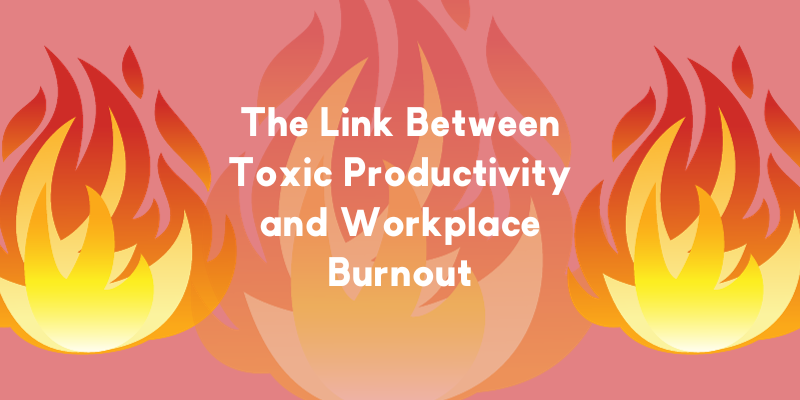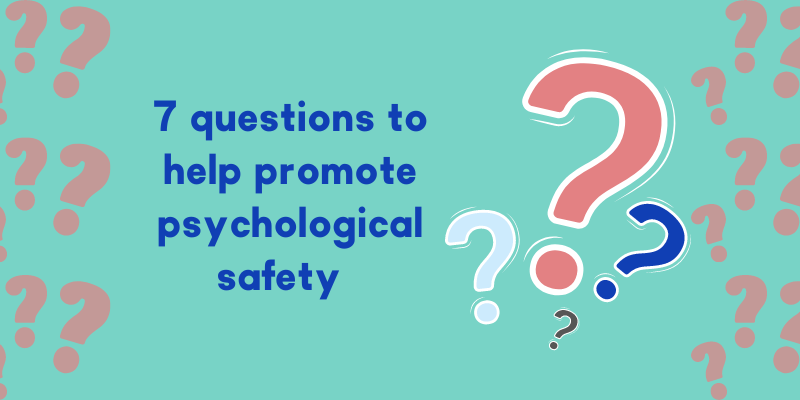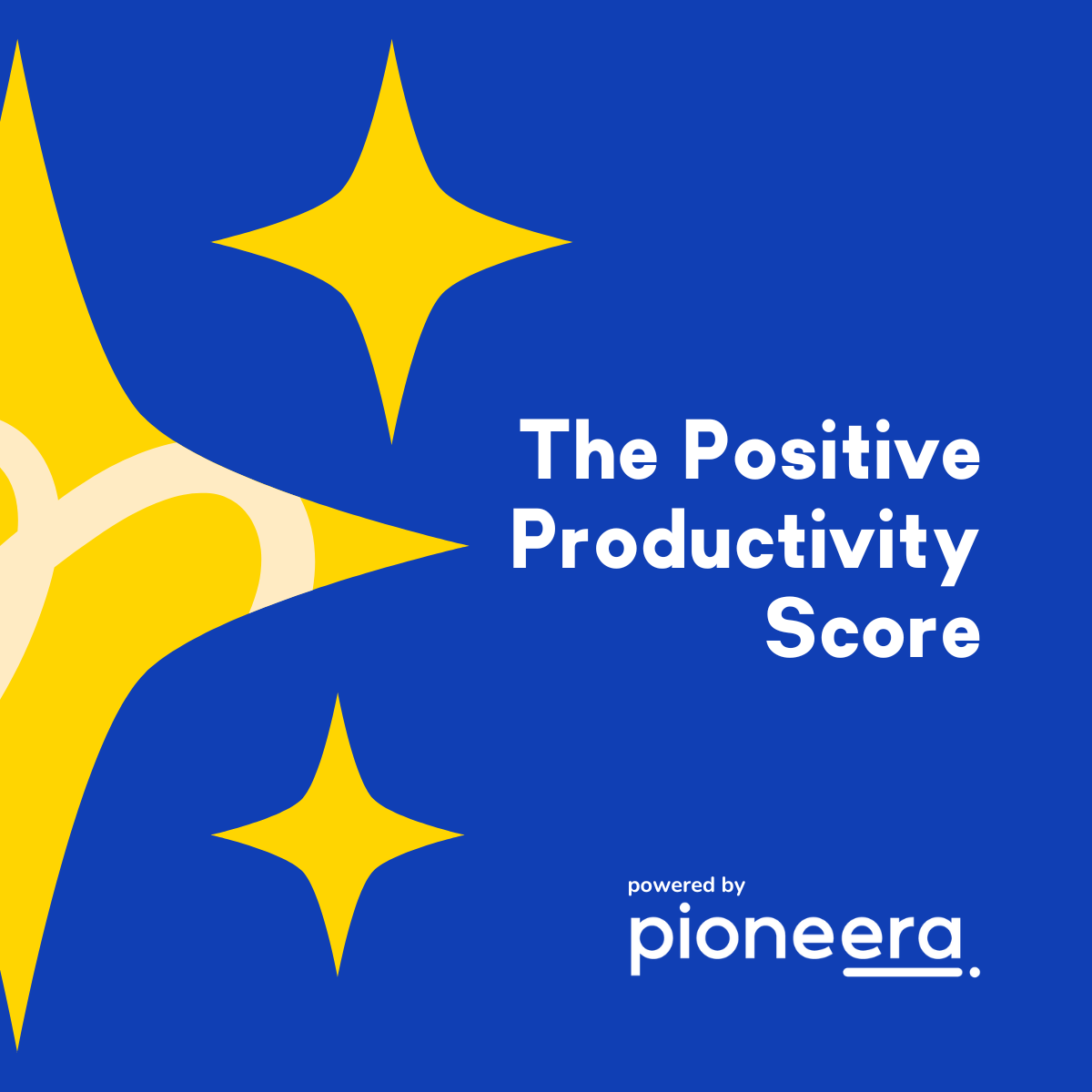Many of us are now working from home due to the COVID-19 outbreak. And while it might be nice to be home (closer to the fridge?), remote working does come with unique challenges not everyone is used to or prepared for.
The team at Pioneera are certainly not strangers to working from home. Some of us have worked our entire careers remotely. Here are a few tips we’ve found useful that we hope can ease some of your stress during this transition and help you stay productive.
Have a morning routine

Establishing a routine is important for mental health, particularly in times of immense change. And just because you're working from home, doesn’t mean you can work in your pyjamas. Go about your usual work morning routine - get up early, maybe do some exercise or meditation, shower, get dressed for work, eat a healthy breakfast.
Try to sit at your desk at a set time, like you would if you were still working from the office. This routine is all about getting yourself into a mindset to be productive. The more you settle into this routine, the more effective it will be. And, let’s face it, no one will take you seriously if you’re on a video call in your pyjamas…
Be flexible

Yes, I know we just talked about having a solid morning routine. But remember that extraordinary times do require flexibility. Working and isolating at home creates a situation where home and work life are so entangled that stress from one will most certainly impact the other. The key is to have your routine, but be flexible enough to deal with change.
If you need to look after the kids for a few hours in the morning, or tend to other personal affairs, then you gotta do it. Don’t stress about it, and don’t let your family feel your anxiety, just be supportive when and how you can. Communicate clearly with your boss/team as to what’s going on. Chances are, they’re in the same boat.
Create a comfortable workspace
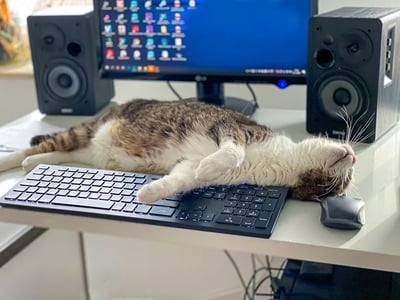
Working from the kitchen bench or dining table may provide a makeshift workspace short-term. But it can have long-term effects on your physical and mental health. Unfortunately, not everyone has the luxury of having a designated home office. But there are ways to make do.
The main things to address here, wherever you’re setting up, are looking after your posture and eyes.
Here are some tips to help you work comfortably for longer to ensure you stay productive:
-
If you’re using a laptop, use an external mouse and keyboard (if you don’t have one, try and source from the office, or buy online if it’s in the budget).
-
Keep your screen an arm’s length away so your eye level is inline with (or just below) the top of your screen. A pile of books can help.
-
Your arms should be above your desk and elbows at 90 degrees when at your sides so your fingers can simply fall onto the keyboard.
-
Try not to twist your body or cross your legs (I must admit, I am guilty of crossing my legs).
-
Open up the curtains to let in as much natural light as possible.
-
Depending on outside noise, open up the windows and let in some fresh air.
-
Alternate between sitting and standing.
-
Avoid the allure of the couch at all costs…
Hot tip: an ironing board plus a shoe box make for a pretty dandy standing desk!
Limit distractions
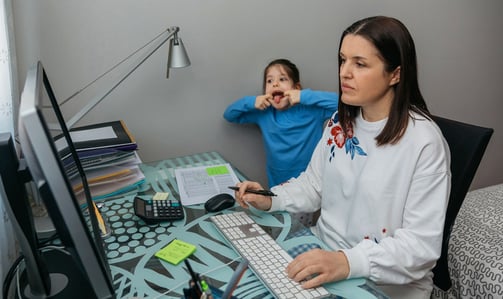
It’s easy to get distracted working from home. No one checking over your shoulder, social media is right there, ooh look some washing that needs to be done, and the kids just love popping in to show how they’ve drawn all over each other with non-washable markers…
Ok. It’s important to accept that there will be distractions out of your control. What you can control is how you react to them, and put systems in place to minimise them.
Ambient noise
Studies show that the direction noise is coming from can have an affect on how distracting we find it. Position your workspace in a way that the majority of ambient noise will be behind you to minimise how distracting your brain perceives the sounds.
Children
If your kid runs into the office, don’t scold them, they probably just want a hug. Embrace them, let them know you’re working and you’ll see them soon for lunch or a coffee break. Look, sometimes it works. Sometimes it doesn’t. But it’s a whole lot better than having a screaming kid in the house while you’re trying to work.
House work
Sure, we get it. The house work needs to get done. Do a big clean up before you go to bed, or first thing in the morning. If you’ve got work to do, don’t hang out the washing or do the dishes. Wait till you’re on a break, then get back to work. Stay focused when you can.
Social media
This is the same as working at the office. Focus on working on single tasks in blocks. Don’t surf the socials until you’re on a break. And limit the time you do. Stay productive. Avoid the scrolling trap. Turn your phone face down on your desk, or put in another room. Oh yeah, and turn off notifications!!
Stay social (virtually)

By nature, humans are social beings. Many of us thrive on the interaction and buzz of an office. Isolation can be lonely, and lead to increased anxiety levels, and even depression.
One way to stave off the isolation blues is to have “water-cooler” chats, coffee and lunch catchups via video chat. Schedule these into your calendar for your break times, and proactively fill them by sending invites. Chatting with a few people over lunch might be the energy boost you need to push through your afternoon.
Take regular breaks

Working from home, there’s a tendency to skip breaks. You’re already at home, which, to some, may feel like you’re not working hard enough. But, when you’re at home for days, weeks, or even months, it’s vital that you take care of yourself to avoid overwork and burnout.
Taking regular breaks can help you:
-
Make better decisions
-
Spark new creative ideas and solutions
-
Stay focused for longer
-
Improve memory retention
-
Refocus on your goals
-
Prevent stress and burnout
-
Be a more pleasant person to be around
Here’s some advice from Daniel Pink on taking effective breaks:
-
5-10 min "micro-breaks" each hour are better than no breaks at all.
-
Commit to your break by not multi-tasking, and leave your phone on your desk.
-
Hourly 5-minute walking breaks are more effective than a single 30-minute break.
-
Sometimes alone time is good, but taking breaks with people can be even better (schedule a coffee over video chat).
-
A short break outside is more beneficial than a long break inside.
Stop work at the end of the day
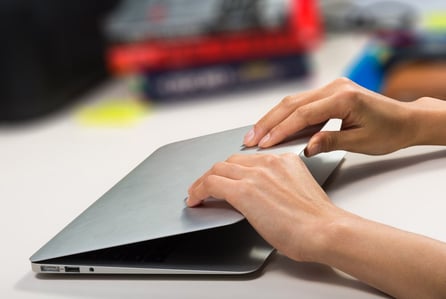
Working from home can make it difficult to switch off from work and settle back into home life. There is also a tendency to work after hours because, technically, you’re still “at work”.
For your own sanity, and that of your family’s, stop work at the end of the day, take the time to be present, and recharge. Your loved ones will thank you for it. And you’ll feel the difference in your stress levels and productivity over time.
An effective way to do this is with an after-work ritual. It can be with some exercise like going for a walk, reading a book, or just closing your computer and saying “I’m done. No more until tomorrow.” The process of finishing your work day with a ritual can help to reduce stress long-term, effectively reducing the risk of burnout.
If you’re after some more tips to help you reduce and manage your stress, check out: How to recognise stress in yourself and what you can do about it
Worried about stress working from home? Indie helps remote workforces of 2-200,000 reduce stress and boost productivity.


